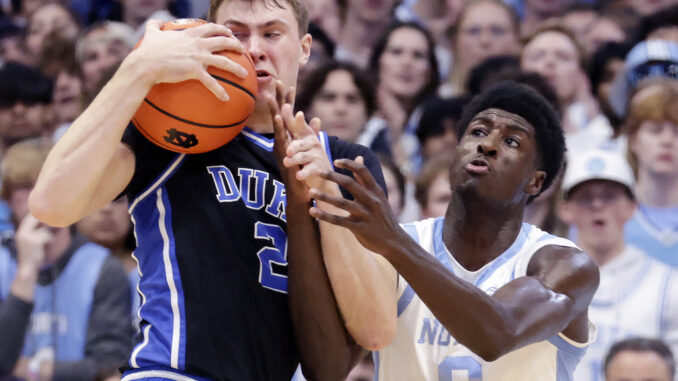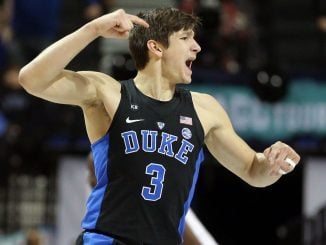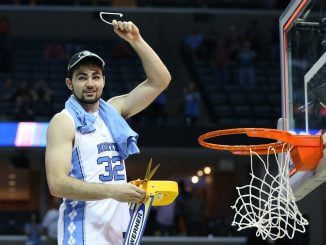
Often, after a rivalry game, Duke and Carolina players talk about heart, desire and wanting it more than the opponent. In a series that has been evenly matched for generations, the desperation is often what makes the difference.
On Saturday, in Chapel Hill, there was no question that the more desperate team was the Tar Heels. UNC needed a win to get an at large bid to the NCAA Tournament. Duke, meanwhile, had spent the last several weeks on cruise control, blowing out ACC opponents at a record rate. In fact, no team, in any conference, had built up such a lopsided scoring differential in the last 70 years—not since Kentucky in 1953-54.
Throw in the fact that RJ Davis, a legendary Tar Heel, the program’s all-time three-point shooting leader and second-leading scorer, was playing his last home game, and the intangibles were tilted heavily in favor of Carolina.
Now, all the Heels needed was for a few things to fall their way. The combination of grit and luck would bring them victory. Fall, they did. Duke’s MVP and likely national player of the year Cooper Flagg picked up two early fouls, then returned to the game later in the first half and committed his third.
On the other side, Davis was feeling it, capturing the magic that won him an ACC Player of the Year award. He scored 15 points in the first half, including seven in a 100-second stretch that saw a 15-point Duke lead cut to one at halftime.
“It’s like what you live for, right?” Davis said. “You prep for these type of moments, these type of games. For me to come out in the first half, shooting the basketball and hitting threes, it was something I envisioned in my head.”
UNC kept right on going after the half, building a seven-point lead over the reeling Blue Devils.
For Duke coach Jon Scheyer, however, it was just what the doctor ordered.
“I thought it was incredible to go through,” he said. “The first thing I said (to the team) at half is, ‘This is great.’ But I knew we needed it. It was the best thing for us. At the start of the second half, to go down seven and claw our way back? We test our trust in those moments.”
Admittedly, Scheyer has his eyes focused farther down the March calendar than Saturday night, and he’d rather have Duke overwhelmed in a regular season game than a tournament contest where a loss ends the year.
Foul trouble will happen at some point in March. So will a hot-shooting opponent. And when it does, the long string of ACC blowouts won’t do Scheyer and the Blue Devils a bit of good. A game like Saturday at the Dean Dome, however, is something to build on.
Duke passed its test of trust. Kon Knueppel, Sion James and Tyrese Proctor all stepped up in Flagg’s absence, combining for 30 of Duke’s 43 first-half points. Duke also turned to Caleb Foster, who was benched for the previous game, to run the offense for much of the second half.
“It was his response to that (benching),” Scheyer said. “I would say the majority of the time, if not all the time, guys can pout, quit, make an excuse or be be po-ed. I’m sure he’s po-ed at me. That’s fine. That’s good. I’m all for that. His attitude was he had such a competitiveness the last couple days. As we got into the game, we were missing what he had—his ball handling, his speed. To be ready is a credit to him. Amazing character.”
Flagg also showed character, playing the entire second half without picking up another foul.
“You worry about him being hesitant, not being himself,” Scheyer said. “I told him to be aggressive … For him to get four blocks while having the three fouls was big time.”
The Blue Devils erased the Tar Heel lead and rebuilt their double-digit margin, cruising to an 82-69 win and wrapping up a 19-1 ACC season.
Not bad for a team that wasn’t as desperate as the other guys.
“Once you get to March, it can’t be just about wanting it more,” Scheyer said. “Because the team you play also wants it a lot. Obviously, you’ve got to make sure your competitiveness is at a certain level, your fight is at a certain level, but it also comes down to having great focus and understanding the value of this game for both teams.”
Just a bit of perspective, before the madness begins.



